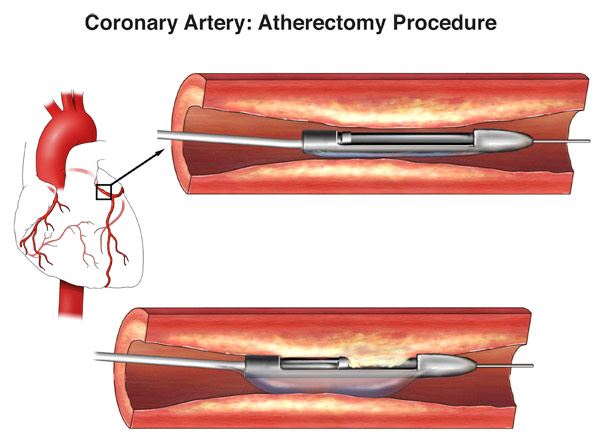Atherectomy
Atherectomy is a minimally-invasive procedure performed to remove plaque from an artery that is partially blocked. Plaque is a fatty, waxy deposit which slowly builds-up in the arteries over time and affects them by making them thicker and narrower. This is known as atherosclerosis. This will reduce the amount of oxygen and blood being provided to organs connected to these blocked arteries. In addition, plaque may rupture, spilling cholesterol and other substances into your bloodstream. This can lead to a blood clot, which can in turn block the blood flow to a specific part of your body. If the blocked artery supplies the heart or brain, a heart attack or stroke occurs.
Atherectomy enables your doctor to shave off or vaporize the plaque via the use of tiny rotating blades or a laser on the end of a catheter. Atherectomy is sometimes performed on patients with very hard plaque or on patients who have already had angioplasty and stents, but who still have plaque blocking the flow of blood.
Do you have a question? Request more information and we will connect you with an RWJBarnabas Health cardiovascular expert.
How to Prepare for the Procedure
Before the procedure, your doctor and treatment team will explain to you what to expect before, during and after the procedure and potential risks of the procedure. Talk to your doctor about:
- All medications, herbal products and dietary supplements you are currently taking and ask for their recommendations about each.
- Diabetes and how to adjust your medicine on the day of the procedure.
- Radiation exposure, especially for those that are pregnant.
- Any allergies to medicines, latex, tape, iodine, and anesthetic agents.
- Any history of bleeding disorders.
- Any implanted device (e.g. pacemaker or ICD).
- Any body piercings on your chest or abdomen.
Other recommendations include:
- Eat a normal meal the evening before the procedure. However, do not eat, drink or chew anything after midnight before your procedure. If you must take medications, only take them with sips of water.
- Leave all jewelry at home.
- Remove all makeup and nail polish.
- Wear comfortable clothing when you come to the hospital.
- If you normally wear dentures, glasses, or hearing devices at home, plan to wear them during the procedure.
What to Expect Before the Procedure
Before the procedure, your doctor might perform a variety of diagnostic tests, including:
What to Expect During the Procedure

Medical Illustration Copyright © 2019 Nucleus Medical Media, All rights reserved.
Atherectomy usually takes 2 hours to complete, but the preparation and recovery time add several hours. The procedure is usually performed in the catheterization lab. Check with your doctor about the details of your procedure. In general:
- You will change into a hospital gown.
- Prior to starting the procedure, you will receive a local anesthetic. Once you are sedated, your doctor may insert a breathing tube through your throat into your lungs and connect you to a ventilator. This will breathe for you during surgery.
- Your surgeon will insert a catheter equipped with a sharp blade at its tip and advance it through your artery until it reaches the area of narrowing.
- Your surgeon will then scrape away the plaque with the catheter blade.
- The plaque will be collected in a chamber at the tip of the catheter for removal.
- The surgeon may need to pass the catheter multiple times in order to remove a significant amount of atherosclerosis.
- Once the procedure is complete, the surgeon will remove the catheter and close the incision with the use of bandages or sutures.
What to Expect After the Procedure
After the procedure, you will be taken to the recovery room and may need to stay in the hospital for 1 to 2 days. The breathing tube is removed when you wake up from anesthesia.
Recommendations include:
- Following the procedure, you will need to lie flat for three to six hours.
- Diet is started the day after surgery with liquids, and quickly advanced to solids as tolerated.
- Ambulation is started on the first or second day of surgery.
- Your doctor will give you instructions to follow during your recovery.
Do you have a question? Request more information and we will connect you with an RWJBarnabas Health cardiovascular expert.
